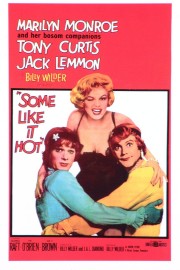Some Like It Hot
Billy Wilder is such an institution within American cinema, it’s easy to forget that he was actually born in Austria. Yes, he came to the States in 1933, and never looked back, but that outsider sensibility never really left him, and is evident in every one of his films, regardless of genre. And Wilder was someone who worked in just about all of them. His big love, though, was comedy, and in each of his efforts, he helped bring the genre into the modern age with bold wit, bawdy sexuality, and a dizzying amount of one-liners.
Never was that more true than in his 1959 classic, “Some Like It Hot.” The enduring images from the film are of the radiant Marilyn Monroe, who came alive as a performer under Wilder’s direction, but the film is so much more than just Monroe looking pretty. As written by Wilder and I.A.L. Diamond, the film is a master class in comedic tones, both high and low, while also telling a story that manages to be sweet and romantic in all the right ways.
The film stars Jack Lemmon and Tony Curtis as out-of-work jazz musicians who witness the St. Valentine’s Day massacre of 1929. Broke, and needing to get out of town quickly, they catch wind about a band needing a bass player and a sax, their respective instruments, before they go to a gig in Florida. The catch? It’s an all-girl band. Let the cross-dressing absurdity begin, and it’s only made more complicated by the very male desires Joe (Curtis) and Jerry (Lemmon) feel for Sugar Kane, Monroe’s voluptuous ukulele player. Once they get to Florida, the cross-dressing gets really crazy, as Joe roleplays as a male millionaire to go out with Sugar, while Jerry is getting looks from a gentlemen suitor (the great Joe E. Brown) of his own. It starts off rough, but it’s not long before things really heat up for them, leading to one of the great final lines in movie history. Scratch that: THE great final line in history.
Farce is a very tricky thing to get right. Nowadays, it typically means toilet humor and gratuitous sexcapades, but back in the ’50s and earlier, the Production Code (which predated the MPAA’s rating system) meant being as subtle as one could be if you wanted to get your movie released. Wilder was one of the big game-changers in movie comedy, pushing the limits of good taste and sexuality as far as he could before other filmmakers took it to a new level come the ’70s onward. But Wilder was smart to leave some things to the imagination; he, like so many other filmmakers at that time, understood that it’s suggestion that is more potent than just seeing everything all hang out. That’s never more true than it is in “Some Like It Hot,” where there’s a narrative reason for favoring suggestion and innuendo, but the restraint, such as it is, results in a better, funnier film.
Take the relationship between Jerry (who goes by the name Daphne) and Osgood, the millionaire played by Brown. At first, Jerry is appalled when Osgood, who is stricken by the love bug at first sight, tries to get fresh with him, but after Joe (going by Josephine) sets him up with Osgood as a way to be alone with Sugar Kane on a yacht, Jerry is surprisingly engaged. Watch how Jerry and Osgood tango, and how a rose starts in one mouth and ends up in another, and how giddy Jerry is the next morning. That’s real affection that Jerry’s displaying. Maybe; both he and Osgood, who’s been married so often he doesn’t keep count, seem to have more cynical motivations, but when you hear the way Jerry’s talking about a possible marriage to Osgood, you sense something real in his voice, like he’d genuinely enjoy being with Osgood. Was this even controversial back in 1959, the idea of a man pretending to be a woman marrying a man? Now, it would be discussed as the front lines of a culture war for many. But back then, it played as Hollywood fantasy, as farce, but it’s hard to imagine Wilder not cackling behind the camera, as if he got away with something unheard of in plain sight.
Looking at it now, it’s hard not to see “Some Like It Hot” as something of a groundbreaker. Yeah, it’s very easy to enjoy as a classic Hollywood comedy, with icons like Lemmon, Curtis, and Monroe trading banter and one-liners with the joy and ease of a well-practiced band, but watching a little more closely, you get the sense that Wilder has more to say about romance and gender roles and sexual politics than you’d get from your average Hollywood comedy, then and now. Ultimately, the film is about accepting yourself for who you are, and allowing others to accept you, warts and all. That’s what that final line, spoken so perfectly by Brown, is about. This is who these people are, and when love is in the air, it’s best to just run with it, and enjoy the ride. After all, nobody’s perfect. Wilder came damn close, though.










